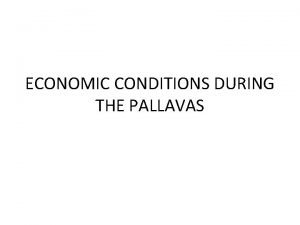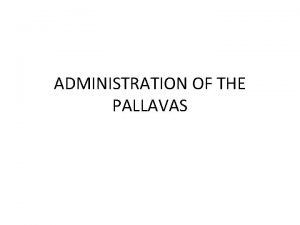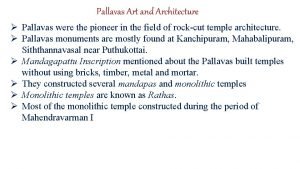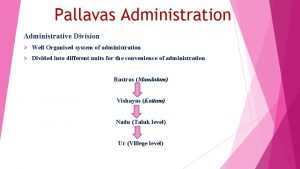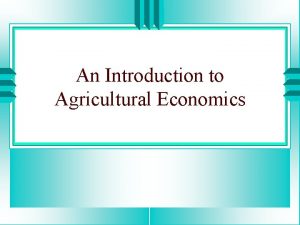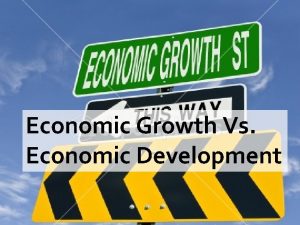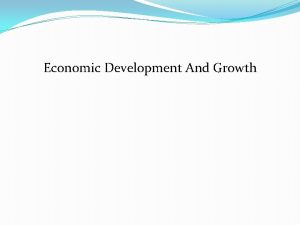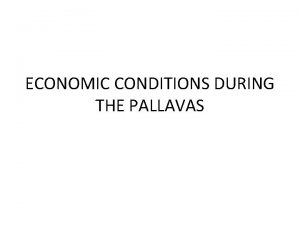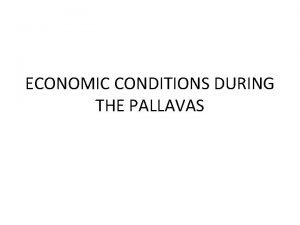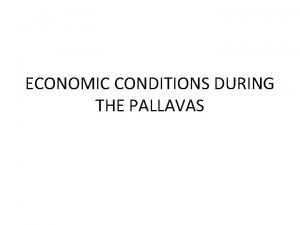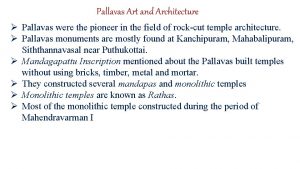ECONOMIC CONDITIONS DURING THE PALLAVAS ECONOIC LIFE Agriculture









- Slides: 9

ECONOMIC CONDITIONS DURING THE PALLAVAS

ECONOIC LIFE Agriculture. The economy had remained self sufficient of the Pallava Kingdom was chiefly based on Villages and agriculture Paddy and Cotton were extensively cultivated. Rice was exported to China and East Indies. The creation of the Brahmadeya villages had started during the Pallava period. The Brahmins began to settle in these villages and they were exempted from paying taxes. The Lands donated to the temples were called as Devadanas. The number of villages had increased during the Pallava rule.

There were two types of lands __ Cultivable Lands and Arid Lands Arid lands were reclaimed and cultivated. The Pallava kings had erected sevesral irrigation Tanks The pallava ruler Mahendravarman I erected the Mamandur Tank called Chitra Mega Tadakam. Handicrafts. The Crafts of the Pallava period include Weaving , Stone Cutting , Pottery , Carpentry and Ivory Works , The Cotton Clothes were exported to China , Babylonia and Egypt. Kanchipuram had remained an important centre for Silk Weaving.

Internal Trade The increase in production and the expanding economy under the Pallavas led to the growth of Trade. There was a remarkable growth in the internal trade. The regular markets had gradually become urban centres. There were excellent highways to transport goods from one place to another. The Capital city , Kanchipuram had remained an important trading centre. The merchants of the Pallava period had to obtain license to keep shops and they were also asked to pay taxes. The Pallavas had issued Gold and Silver Coins , which had resulted in the expansion of commerce. The merchants had formed their own organizations called Manigramam.

Foreign Trade. Spices , Cotton Textiles , Precious Stones and Medicinal Plants were exported to the countries like Java , Sumatra , Kadaram , Combodia , Sri Lanka , China and Burma. The foreign merchants were known as Nanadesi Mamallapuram and Mylapore were the important seaports of the Pallavas. Weights and Measures. Lands were measured with the units called Uzhavu, Nivarthanam or Pattiga and Hala refers to the unit of land. Plough was used for measuring the land. Paddy and Rice were measured by Chudunazhhi. The other units such as Videl , Vidugu and Uzhkku were also used for measurement. Pidi was the smallest unit.

The units such as Aazhakku , Uri and Nazhi were used to measure items like Milk , Ghee , and Oil. Gold was measured by the units called Kazhanju and Manjadi. _____

Religion under the Pallavas. During the Pallava period , both Saivism and Vaishnavism had been revived , The Pallava rulers patronized both these religions. The spread of Bhakthi Movement was encouraged by the Pallava rulers. Bhakthi Movement. The Bhakthi Movement , which had spread in South India during Sixth and Seventh centuries AD , made a tremendous impact in the Social and Cultural life of the people. The term Bhakthi means Devotion to God. True Bhakthi was considered as more valuable than mere rites and rituals. During the period of Pallavas Alzhwars and Nayanmars preached the cult of Bhakthi among the people.

Saivism. The followers of Lord Siva were known as Saivaites , the saiva Saints , Nayanmars had preached Saivism. There were Sixty Three Nayanmars , the most important among them were Tirunavukkarasar , Thirugnanasambandar Sundarar and Manickavasagar There was also woman saints like Karaikkal Ammaiyar. They composed devotional songs and spread Bhakthi among the minds of the people.

 Social and economic condition of pallavas
Social and economic condition of pallavas Pallavas administration
Pallavas administration Pallavas art
Pallavas art Pallavas administration
Pallavas administration Importance of agricultural economics
Importance of agricultural economics Iraq war
Iraq war Working conditions during the industrial revolution
Working conditions during the industrial revolution Economic growth vs economic development
Economic growth vs economic development Conclusion of growth and development
Conclusion of growth and development Economic systems lesson 2 our economic choices
Economic systems lesson 2 our economic choices
